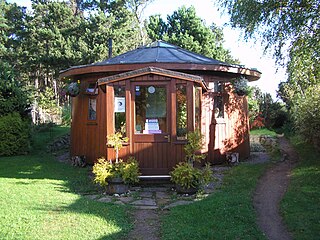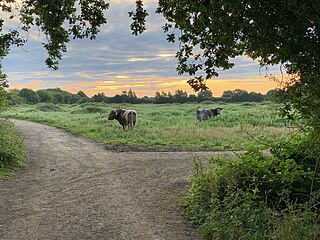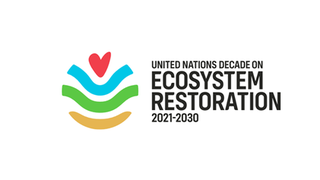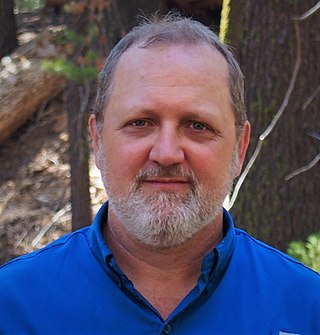Related Research Articles

Natural capital is the world's stock of natural resources, which includes geology, soils, air, water and all living organisms. Some natural capital assets provide people with free goods and services, often called ecosystem services. All of these underpin our economy and society, and thus make human life possible.

The Findhorn Foundation is a Scottish charitable trust registered in 1972, formed by the spiritual community at the Findhorn Ecovillage, one of the largest intentional communities in Britain. It has been home to thousands of residents from more than 40 countries. The Foundation closed all its educational programmes in September 2023 whereas the Findhorn community eco village at Findhorn houses about 40 community businesses such as the Findhorn Press and an alternative medicine centre.
John Todd is a Canadian biologist working in the general field of ecological design. He addresses problems of food production and wastewater processing by using ecosystems technologies that incorporate plants, animals and bacteria. Todd has developed "Arks" or "bioshelters", ecologically closed "life-support systems" with the goal of sustainable functioning. He combines alternative technologies for renewable energy, organic farming, aquaculture, hydroponics and architecture to create "living machines" or "eco-machines".

Daniel Hunt Janzen is an American evolutionary ecologist and conservationist. He divides his time between his professorship in biology at the University of Pennsylvania, where he is the DiMaura Professor of Conservation Biology, and his research and field work in Costa Rica.

A secondary forest is a forest or woodland area which has regenerated through largely natural processes after human-caused disturbances, such as timber harvest or agriculture clearing, or equivalently disruptive natural phenomena. It is distinguished from an old-growth forest, which has not recently undergone such disruption, and complex early seral forest, as well as third-growth forests that result from harvest in second growth forests. Secondary forest regrowing after timber harvest differs from forest regrowing after natural disturbances such as fire, insect infestation, or windthrow because the dead trees remain to provide nutrients, structure, and water retention after natural disturbances. Secondary forests are notably different from primary forests in their composition and biodiversity; however, they may still be helpful in providing habitat for native species, preserving watersheds, and restoring connectivity between ecosystems.

Ecological restoration, or ecosystem restoration, is the process of assisting the recovery of an ecosystem that has been degraded, damaged, destroyed or transformed. It is distinct from conservation in that it attempts to retroactively repair already damaged ecosystems rather than take preventative measures. Ecological restoration can reverse biodiversity loss, combat climate change, support the provision of ecosystem services and support local economies. The United Nations has named 2021-2030 the Decade on Ecosystem Restoration.

Trees for Life is a registered charity working to rewild the Scottish Highlands.

The John Muir Trust (JMT) is a Scottish charity, established in 1983 to conserve wild land and wild places for the benefit of all. The Trust runs an environmental award scheme, manages several estates, mainly in the Highlands and Islands of Scotland and campaigns for better protection of wild land. In 2017, it took on a lease to manage Glenridding Common in the English Lake District.

The Morton Arboretum, in Lisle, Illinois, United States, is a public garden and outdoor museum with a library, herbarium, and program in tree research including the Center for Tree Science. Its grounds, covering 1,700 acres, include cataloged collections of trees and other living plants, gardens, and restored areas, among which is a restored tallgrass prairie. The living collections include more than 4,100 different plant species. There are more than 200,000 cataloged plants.

Findhorn Ecovillage, known in the past as the Findhorn Community, and also referred to as Ecovillage Findhorn, is an experimental and utopian community project based at The Park, in Moray, Scotland, near the village of Findhorn focused on ecological solutions to the world's crises and reconnecting humans to nature and spirituality. It has recently been bought out by its community residents, introducing full democracy for the first time, as the residents aim to regenerate the economy and the community after a series of shocks to its economy and facilities, caused by Brexit, Covid-19, arson, energy inflation and decades of an aging population and old leadership.

Rewilding is a form of ecological restoration aimed at increasing biodiversity and restoring natural processes. It differs from other forms of ecological restoration in that rewilding aspires to reduce human influence on ecosystems. It is also distinct from other forms of restoration in that, while it places emphasis on recovering geographically specific sets of ecological interactions and functions that would have maintained ecosystems prior to human influence, rewilding is open to novel or emerging ecosystems which encompass new species and new interactions.
Land restoration, which may include renaturalisation or rewilding, is the process of restoring land to a different or previous state with an intended purpose. That purpose can be a variety of things such as what follows: being safe for humans, plants, and animals; stabilizing ecological communities; cleaning up pollution; creating novel ecosystems; or restoring the land to a historical condition, for example how indigenous people managed the land. Ecological destruction or degradation, to which land restoration serves as an antidote, is usually the consequence of human influence's intended or unintended consequences. This can include pollution, deforestation, salination, or species endangerment, among many more. Land restoration is not the same as land reclamation, where existing ecosystems are altered or destroyed to give way for cultivation or construction. Land restoration can enhance the supply of valuable ecosystem services that benefit people.

Akira Miyawaki was a Japanese botanist and an expert in plant ecology who specialized in seeds and natural forests. He was active worldwide as a specialist in natural vegetation restoration of degraded land.

Vance G. Martin is an agent in international nature conservation and wilderness protection, and a writer. Martin specializes in bridging the interests of people and nature through culture, communications, science, and policy. He has worked and lived in many countries, 75 or more, and served on the boards of numerous conservation and business organizations. He founded, and from 1984 through 2022, served as President of the WILD Foundation, an international conservation organization explicitly dedicated to protecting wilderness, connecting wild nature to people, and to communicating the values of wilderness and its benefits for human communities. He currently works through Wilderness Foundation Global, an international alliance based in the Global South that he co-founded in 2016. He is based in Boulder, Colorado (USA).

Forest restoration is defined as "actions to re-instate ecological processes, which accelerate recovery of forest structure, ecological functioning and biodiversity levels towards those typical of climax forest", i.e. the end-stage of natural forest succession. Climax forests are relatively stable ecosystems that have developed the maximum biomass, structural complexity and species diversity that are possible within the limits imposed by climate and soil and without continued disturbance from humans. Climax forest is therefore the target ecosystem, which defines the ultimate aim of forest restoration. Since climate is a major factor that determines climax forest composition, global climate change may result in changing restoration aims. Additionally, the potential impacts of climate change on restoration goals must be taken into account, as changes in temperature and precipitation patterns may alter the composition and distribution of climax forests.
Emily S. Bernhardt is an American ecosystem ecologist, biogeochemist, and professor at Duke University.

The United Nations Decade on Ecosystem Restoration runs from 2021 to 2030. Similar to other nature related international decades, its purpose is to promote the United Nations’ environmental goals. Specifically, to facilitate global cooperation for the restoration of degraded and destroyed ecosystems. Along with fostering efforts to combat climate change, safeguard biodiversity, food security, and water supply. While much focus is on promoting restoration activity by national governments, the UN also wishes to promote such efforts from other actors, ranging from the private sector and NGOs to regular individuals.

Bradley Cardinale is an American ecologist, conservation biologist, academic and researcher. He is Head of the Department of Ecosystem Science and Management and Penn State University.
Lee Schofield is a British naturalist and nature writer. He wrote Wild Fell: Fighting for Nature on a Lake District Hill Farm, which describes his work as site manager for the RSPB at Haweswater in the Lake District National Park.
References
- 1 2 3 4 5 6 7 8 9 10 11 12 13 "Alan Watson Featherstone confirmed as keynote speaker for green events and innovations". A Greener Festival Limited. 13 December 2013. Archived from the original on 16 April 2014. Retrieved 15 April 2014.
- 1 2 "Wild Things! Board of Directors". Wild Things!. 2014. Retrieved 15 April 2014.
- ↑ "Travel: The Grumpy Green: Return of the natives". The Guardian. 15 November 2008. ProQuest 244320433.
In 1992 Alan spotted an opportunity to join up patches of forest in Glen Affric, creating a wooded corridor right across the country, a vision now nearing completion. This year the charity also bought the 10,000-acre Dundreggan estate in neighbouring Glen Moriston, allowing the possibility of bringing other valleys into the project
- ↑ "Repair work: Activists take on Earth restoration". The Guardian . 13 March 2002. Retrieved 15 April 2014.
- 1 2 "Alan Watson Featherstone". Schumacher College. 2014. Retrieved 15 April 2015.
- ↑ "Farmer who took on Trump triumphs in Spirit awards". The Scotsman . 29 November 2012. Retrieved 15 April 2014.
- ↑ "Nature of Scotland Awards – 2013 winners". Royal Society for the Protection of Birds. 28 November 2013. Retrieved 15 April 2014.